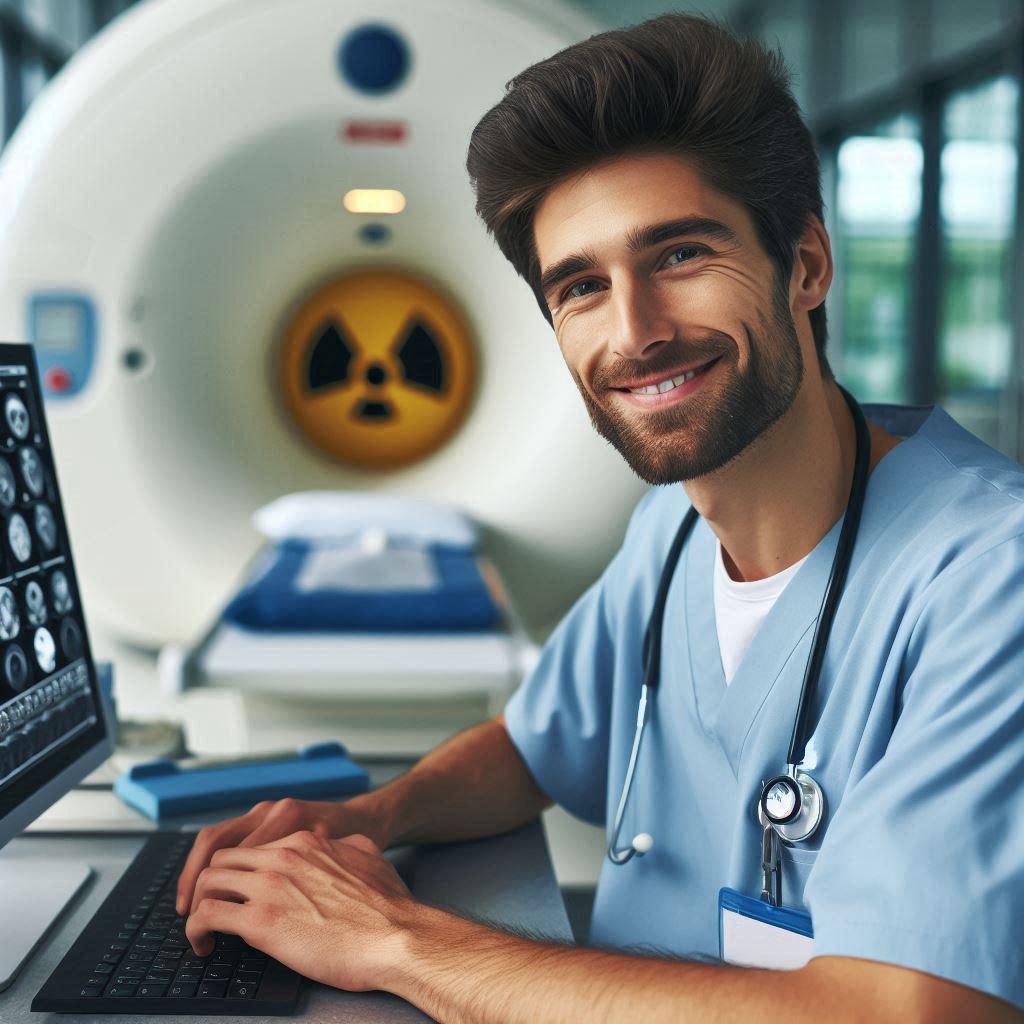Introduction
In the dynamic field of nuclear medicine technology, technologists play a crucial role.
They administer radioactive drugs for diagnostic and therapeutic purposes, working closely with patients and medical teams.
Effective communication is pivotal in this profession. Clear interactions ensure accurate patient histories, vital for safe procedure planning.
Technologists must convey complex medical information to patients, ensuring informed consent and alleviating anxieties.
Moreover, precise communication with radiologists and physicians guarantees accurate interpretation of imaging results.
Effective communication fosters a collaborative healthcare environment, enhancing patient outcomes and safety.
It ensures smooth workflow, minimizing errors in administering and recording radioactive materials.
As advocates for patient welfare, nuclear medicine technologists must uphold high communication standards.
Their ability to explain procedures and results clearly builds trust and compliance among patients.
In essence, effective communication is not just beneficial but essential for nuclear medicine technologists.
It underpins professional practice, ensuring ethical conduct and optimal patient care.
By mastering communication skills, technologists elevate their role in the healthcare team, contributing to improved diagnostic accuracy and patient satisfaction.
Importance of Patient Interaction
Patient interaction is more than procedural; it’s about creating a supportive atmosphere where patients feel valued and understood.
Building rapport starts with attentive listening and empathetic responses.
When patients feel their concerns are heard, they become more cooperative and comfortable with the procedures.
This connection not only improves patient satisfaction but also contributes to better outcomes.
Significance of building rapport with patients
Building rapport establishes a foundation of trust between the technologist and the patient.
Patients are often anxious about medical procedures, especially those involving nuclear medicine.
A friendly demeanor and open communication help alleviate these fears.
This trust fosters a positive experience and promotes patient cooperation throughout the process.
Transform Your Career Today
Unlock a personalized career strategy that drives real results. Get tailored advice and a roadmap designed just for you.
Start NowHow effective communication can help ease patients’ anxiety and enhance their overall experience
Clear communication is essential in demystifying the procedure for patients.
Explaining each step in simple, non-technical language helps patients understand what to expect.
This transparency reduces anxiety and allows patients to feel more in control of their healthcare journey.
Moreover, showing empathy and reassurance can significantly improve the overall experience, making it less daunting for patients.
Examples of how good communication skills can improve patient compliance and cooperation during procedures
During nuclear medicine procedures, patient cooperation is critical for obtaining accurate results.
Effective communication ensures patients understand the importance of following preparatory instructions, such as fasting or medication adjustments.
Technologists who communicate clearly and respectfully are more likely to receive patient cooperation, leading to successful imaging outcomes.
For instance, explaining the benefits of cooperation in achieving precise diagnostic images encourages patients to adhere to guidelines, ensuring the effectiveness of the procedure.
In fact, effective communication is not just a skill but a cornerstone of compassionate care in nuclear medicine.
By building rapport, easing anxiety, and promoting cooperation, technologists create a supportive environment that enhances patient outcomes and satisfaction.
Read: Orthopedic Technologist: Key Tools and Equipment
Interdisciplinary Collaboration
Effective communication in nuclear medicine technology is crucial when collaborating with other healthcare professionals. Here are some key points to consider:
Importance of Effective Communication
When working in a multidisciplinary healthcare setting, nuclear medicine technologists must communicate effectively with other professionals, such as radiologists, oncologists, and nurses.
Clear communication ensures that important patient information is shared accurately and timely.
Facilitating Sharing of Patient Information
By maintaining open and transparent communication channels, nuclear medicine technologists can ensure that all team members are informed about the patient’s condition, treatment plan, and any specific considerations related to nuclear medicine procedures.
This sharing of information allows for a coordinated approach to patient care.
Impact on Patient Care Outcomes
Collaboration and teamwork among healthcare professionals lead to improved patient care outcomes.
When each team member understands their role and communicates effectively with others, there is a better chance of providing comprehensive care that is tailored to the patient’s needs.
Additionally, clear communication helps in the seamless coordination of appointments, procedures, and follow-up care, which ultimately enhances the overall patient experience and contributes to better health outcomes.
Read: Specializations in Nuclear Medicine Technology
Transform Your Career Today
Unlock a personalized career strategy that drives real results. Get tailored advice and a roadmap designed just for you.
Start NowSafety Protocols and Procedures
Clear communication is essential in ensuring adherence to safety protocols in nuclear medicine procedures.
Technologists must effectively convey instructions and guidelines to uphold safety standards.
Importance of Clear Communication
- Prevents misunderstanding of safety protocols
- Ensures all team members are aware of procedures
- Reduces the risk of errors or accidents
When communication is unclear or insufficient, there is a higher likelihood of safety breaches occurring during nuclear medicine procedures.
Each step must be clearly communicated to avoid any mistakes that could jeopardize patient safety.
Prevention of Errors and Accidents
- Communication breakdown can lead to incorrect dosages
- Misinterpretation of instructions may result in improper handling of radioactive materials
- Lack of communication about patient history can lead to unsuitable procedures
For example, if a nuclear medicine technologist fails to communicate the correct dosage of radioisotopes to be administered, it could lead to overexposure or underexposure to radiation.
This miscommunication can have serious consequences for the patient’s health.
Similarly, misinterpretation of safety protocols due to poor communication can result in mishandling of radioactive materials, putting both patients and staff at risk.
It is crucial for technologists to communicate effectively to prevent such errors.
Furthermore, when there is a lack of communication about a patient’s medical history or specific conditions, it can lead to the performance of unsuitable procedures.
This oversight can have detrimental effects on the patient’s well-being and treatment outcomes.
In fact, clear and effective communication is paramount in nuclear medicine to ensure the strict adherence to safety protocols and prevent errors or accidents that could compromise patient safety and well-being.
Read: Orthopedic Technologist vs. Orthopedic Technician

Educating Patients and Families
Role of nuclear medicine technologists in educating patients and their families about procedures
Nuclear medicine technologists are responsible for guiding patients and their families through the entire imaging process.
They explain the purpose of each procedure, such as PET scans or bone scans, in clear, understandable language.
By detailing what to expect during the procedure, potential side effects, and any necessary preparations, technologists help alleviate anxiety and build trust.
How effective communication can help ensure understanding and compliance with pre and post-procedure instructions
Clear communication is essential in ensuring patients comprehend and adhere to pre and post-procedure instructions.
Technologists must articulate complex medical concepts in accessible terms, ensuring patients understand the importance of fasting, hydration, or medication adjustments before scans.
Post-procedure, they clarify recovery guidelines, potential symptoms, and follow-up procedures, enhancing patient compliance and safety.
Impact of clear communication on patient satisfaction and outcomes
Clear communication positively influences patient satisfaction and treatment outcomes.
When patients understand the purpose, risks, and benefits of nuclear medicine procedures, they feel more informed and involved in their care decisions.
Transform Your Career Today
Unlock a personalized career strategy that drives real results. Get tailored advice and a roadmap designed just for you.
Start NowThis understanding fosters trust between patients and technologists, leading to improved satisfaction with the healthcare experience.
Moreover, informed patients are more likely to adhere to treatment plans, resulting in better diagnostic accuracy and treatment efficacy.
In summary, effective communication by nuclear medicine technologists is pivotal in educating patients, ensuring compliance with medical instructions, and enhancing overall patient satisfaction and treatment outcomes.
Read: Nuclear Medicine Technologist Clinical Practice
Explore Further: Essential Tools for Medical Transcriptionists
Managing Challenging Situations
When working as a nuclear medicine technologist, it is crucial to remain calm and composed in challenging situations.
These moments can arise unexpectedly, testing your ability to communicate effectively and handle conflict with grace.
Importance of Staying Calm
- Remaining calm in challenging situations is essential as it helps maintain professionalism and ensures patient safety.
- Panic or agitation can escalate conflicts, leading to a breakdown in communication and potentially compromising patient care.
- Staying calm allows you to think clearly and respond appropriately, making it easier to de-escalate tense situations.
De-escalating Conflicts with Effective Communication
- Effective communication skills play a significant role in defusing conflicts or difficult encounters with patients.
- Active listening can help you understand the patient’s concerns and grievances, showing empathy and building rapport.
- Using non-verbal cues such as maintaining eye contact and a calm demeanor can convey reassurance and understanding.
Improving Communication in High-Stress Situations
- Practice mindfulness techniques to stay present and focused during stressful or emotional encounters.
- Implementing breathing exercises can help regulate your emotions and prevent reactions based on stress or frustration.
- Seek feedback from colleagues or supervisors on your communication skills and areas for improvement.
By honing your communication skills and staying composed in challenging situations, you can effectively navigate conflicts and ensure the best possible outcomes for your patients.
Explore Further: Career Path of a Sleep Technologist
Professional Development
Effective communication is a vital aspect of being a successful nuclear medicine technologist.
As technology continues to evolve and patient needs become more complex, professionals in this field must continuously develop and refine their communication skills to provide optimal patient care.
Ongoing Communication Training
One way nuclear medicine technologists can improve their communication skills is through ongoing training and education.
By participating in workshops, seminars, and continuing education courses, technologists can stay up-to-date on the latest trends and best practices in communication within the field of nuclear medicine.
These training opportunities can help technologists learn how to effectively communicate with patients, colleagues, and other healthcare professionals.
They can also provide insight into how to navigate challenging conversations and situations that may arise in the workplace.
Enhancing Career Advancement Opportunities
Improving communication skills can have a significant impact on career advancement opportunities for nuclear medicine technologists.
Clear and effective communication is key to building strong relationships with patients and colleagues, which can lead to increased job satisfaction and opportunities for professional growth.
Technologists who excel in communication are often seen as valuable team members who can collaborate effectively with others to achieve common goals.
As a result, they may be considered for leadership positions or other advanced roles within their organization.
Importance of Lifelong Learning
Embracing lifelong learning is critical for nuclear medicine technologists to maintain effective communication practices throughout their careers.
Transform Your Career Today
Unlock a personalized career strategy that drives real results. Get tailored advice and a roadmap designed just for you.
Start NowAs technology and healthcare practices continue to evolve, professionals must adapt and grow to meet the changing needs of patients and the healthcare industry.
Continuing education allows technologists to stay current with advancements in their field and develop new skills that can enhance their communication abilities.
By continually seeking opportunities to learn and grow, technologists can provide the best possible care for their patients and contribute to the overall success of their healthcare team.
Discover More: Medical Technologist Career Advancement Tips
Conclusion
Effective communication is essential for nuclear medicine technologists. It ensures accurate patient information is gathered.
Additionally, it fosters strong relationships with patients, colleagues, and other healthcare professionals.
By emphasizing the importance of clear and concise communication, nuclear medicine technologists can excel in their profession.
Continued development of communication skills is crucial for success in this field and ultimately benefits patient care.
In conclusion, honing communication skills is a lifelong process that can lead to a successful and fulfilling career as a nuclear medicine technologist.
Summary and Call to Action
Effective communication is crucial for nuclear medicine technologists. They explain procedures, provide patient comfort, and ensure safety. Clear communication helps in accurate imaging and effective treatment. It also fosters collaboration with healthcare teams.
Key points discussed include:
- Explaining procedures to patients
- Ensuring patient comfort and safety
- Collaborating with healthcare professionals
- Providing clear instructions for accurate imaging
Effective communication enhances patient care and supports professional growth. Strong communication skills are essential for success in this field.
Continue developing your communication skills to excel as a nuclear medicine technologist. Practice active listening, clear explanations, and empathetic interactions. These skills will benefit your career and improve patient outcomes.




